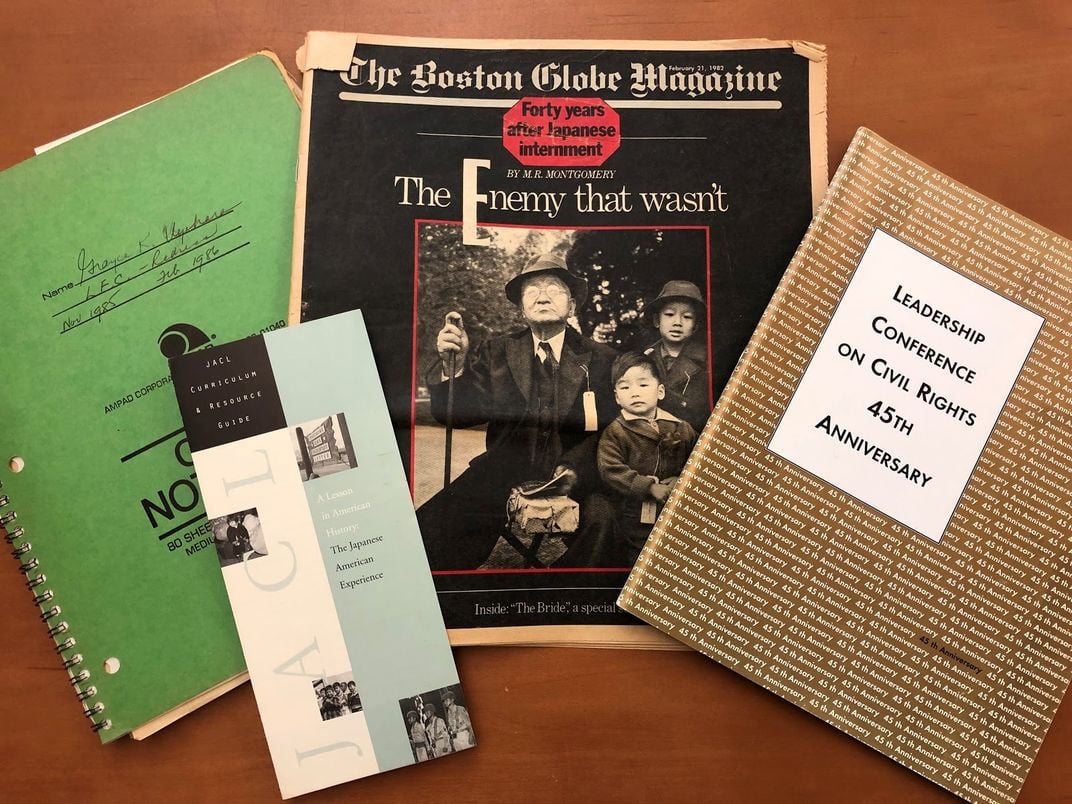OFFICE OF ACADEMIC APPOINTMENTS AND INTERNSHIPS
Because of Grayce Uyehara’s Story: Accessing Asian American Activism in the Archives
The Smithsonian’s American Women’s History Initiative – Because of Her Story – marks an exciting moment for the Smithsonian Institution to intentionally engage with women’s history. Launched in 2018, the initiative is one of the largest efforts to “research, collect, document, display, and share the compelling story of women” through various educational programming across the museum campus. The initiative encompasses a digital focus to “amplify a diversity of women’s voices” across many of the Smithsonian Institution’s programs and sites, including at the National Museum of American History (NMAH).
/https://tf-cmsv2-smithsonianmag-media.s3.amazonaws.com/blogging/featured/Grace_Uyehara_Photograph.jpg)
The Smithsonian’s American Women’s History Initiative – Because of Her Story – marks an exciting moment for the Smithsonian Institution to intentionally engage with women’s history. Launched in 2018, the initiative is one of the largest efforts to “research, collect, document, display, and share the compelling story of women” through various educational programming across the museum campus. The initiative encompasses a digital focus to “amplify a diversity of women’s voices” across many of the Smithsonian Institution’s programs and sites, including at the National Museum of American History (NMAH).
The Museum recognizes that women’s contributions to both America’s most defining moments and the everyday often go unrecognized, yet are so important to the understanding of American history. One of the projects that seeks to change this trend is the arrangement and sharing of the Grayce Uyehara Papers at the Museum’s Archives Center. The Uyehara Papers, acquired in 2019, is an example of both how historically marginalized communities achieved social justice strides, and how online research tools can be used to share these stories more broadly.
Born on July 4, 1919 in Stockton, California, Grayce Uyehara (born Kaneda), once dubbed “the mother of the Redress Movement”, was one of the pivotal figures in the fight to gain reparations from the United States government for the wrongful incarceration of over 120,000 persons of Japanese ancestry during World War II. After the bombing of Pearl Harbor, she and her family were among those incarcerated, first at the Stockton temporary detention facility and then later to the Rohwer incarceration camp in Arkansas. After the war ended, she moved to Philadelphia to continue her life. It was here that Grayce’s lifelong service to activism and community engagement impacted the Japanese American community on a national scale.
Grayce Uyehara’s commitment to activism, social work, and community engagement ultimately led to the success of the Redress Movement. In 1978, the Japanese American Citizens League (JACL) established a National Redress Committee. Although she had no formal experience in politics, Grayce volunteered to be the national director of lobbying operations, confident in her ability to get the job done. She leveraged her strong relationships with other JACL members across various chapters in the country as well as her experience working with African American organizing initiatives in Philadelphia. Her efforts ultimately led to the signing of the Civil Liberties Act of 1988. Her life is exemplary of how women in America have made extraordinary achievements to ensure lasting positive impact on the lived experiences of many in America.

The Grayce Uyehara Papers at the Archives Center contains personal and political material from her life. Included in the collection are her work journals, JACL correspondence, educational curriculum guides, and community newspapers, among other documents. These items are important because they share not only her legacy within the JACL, but also show how she was influenced by and committed to seeing social justice achieved in many other communities. In order to share her materials with more researchers and patrons, the online finding aid is published for all to see, including a detailed biography, reflecting Uyehara’s importance to American history through the digital arrangement of these contents.
Sharing the intricacies of her story on the Smithsonian Online Virtual Archive (SOVA) illuminates the complexity of the redress movement, Japanese American women’s experiences in gaining reparations, and how the redress movement is connected to other Civil Rights mobilizations. By making this finding aid to the papers available online, Grayce Uyehara is able to speak through her own material. It shows how the Smithsonian Institution provides opportunities for people to learn from women’s legacies, and in turn, encourage others to make their own positive strides “to create a more equitable and just American society”.
If you would like to learn more about Grayce Uyehara’s life, check out these resources from: Densho Encyclopedia, Pacific Citizen, Governor’s Residence Exhibit, Scenes From Behind The Scenes, Asian Arts Initiative, Discover Nikkei, YouTube, JACL, and The Philadelphia Inquirer.
And if you would like to learn more about Japanese American women’s experiences during World War II that also touch on Asian-Black relations, check out resources on Fumi Yamamoto from the Yamamoto Family Papers Collection at the Japanese American Service Committee in Chicago.
Sources:
Nakaoka, Susan. Nisei Political Activists: The Stories of Five Japanese American Women. University of California, Los Angeles. 1999. Grayce Uyehara Papers, Archives Center, National Museum of American History.

